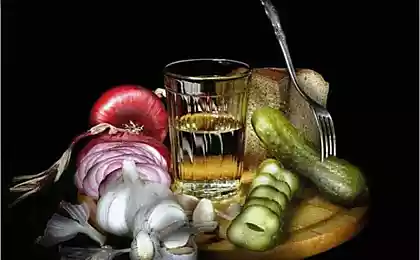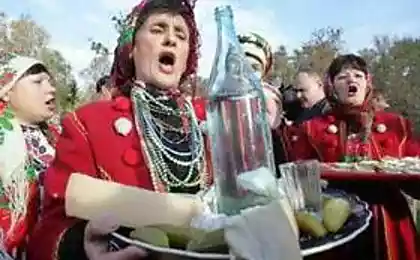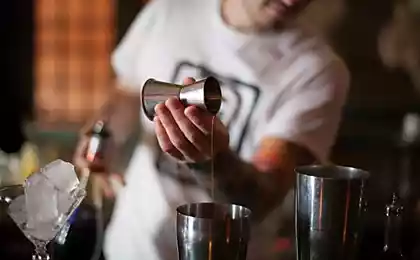1018
What is the "Nip penalty"?
What is the "Nip penalty"? In 4-5. BC. Greek feast becomes a kind of cult. Number of dishes and drinks are not regulated, but there were rules of etiquette prohibiting late to the joint feast. We have heard the statutes, which states that a latecomer to this important event must pay shtraf.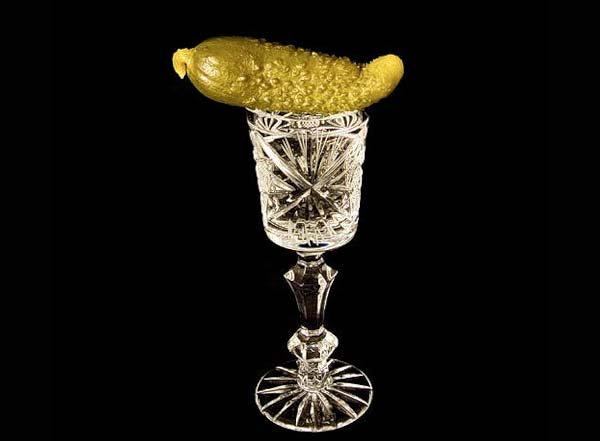
"100 front-line." Their during the Great Patriotic soldiers singled himself Voroshilov. Back in 1940, when the Soviet troops in the 40-degree cold stuck in the snow for Finland, Voroshilov ordered to give 100 grams to raise morale, and also as a warming agent. The official order to issue a "narkomovskih" was released August 22, 1941 the State Committee of Defense SSSR.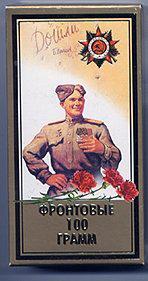
A toast to health. Under Ivan the Terrible vodka was called various medicinal tinctures and potions. We took a very strong alcohol for medicinal purposes. Now I understand why "the health».
On three. In Soviet times, the husband for lunch was made to issue ruble. And the vodka was worth two hundred eighty seven. Do you want to drink - Seek a third (hence the famous "you'll be third?"). And even on the delivery of cheese "Friendship" has ostanetsya.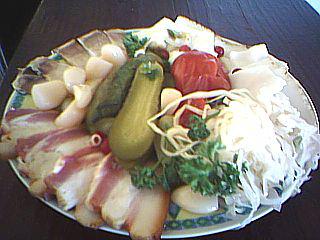
Faceted glass. In the XVII century, these glasses were made of hammered together among themselves dosochek, hence the verge ... First glass faceted glass was made in 1943 to designs by Vera Mukhina. According to another version of the famous glass design belongs to Kazimir Malevich. This glass is characterized by increased resistance - if dropped from a meter height onto a hard surface faceted glass remained tselym.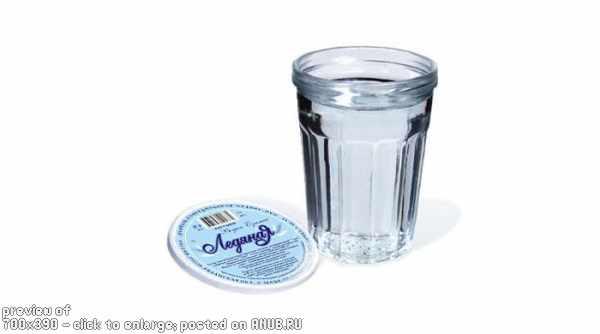
In box 20 bottles of vodka. In pre-Petrine era it was considered the primary measure of vodka bucket. During the reign of Peter I of Russia there is a bottle, it borrows from France. Since the standard bottle had a volume of 0, 6 l., In a bucket fits within exactly 20 bottles. On the basis of these measures was conducted trade documentation ...
Empty bottle can not be put on the table. This provides the following legend: this custom brought the Cossacks, who returned from France after a military campaign of 1812-14 years. In those days, the Parisian waiters do not take into account the number of dispensed bottles. It is much easier to bill - count the empty bottles left over after the meal on the table. One of the Cossacks, and realized that you can save money by removing part of the empty bottles under the table.
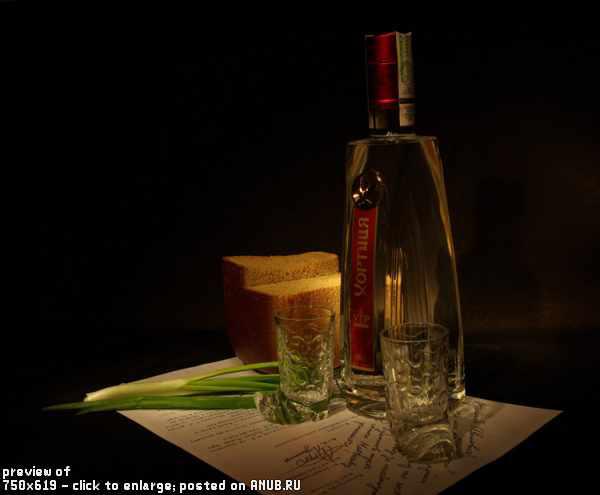
One for the road to the track.
It has long been in Russia strangers and travelers enjoyed special respect. Rogue did not like, and strangers privechali. For the pilgrims went through the world not from idleness, and the need mental - on a pilgrimage (pilgrims) walked to the holy places, and for related trade. There were special prayers before the journey and after successful completion, there were practices which firmly adhered to.
Wanderers went from village to village, from one place to the next covenant, leaning on his staff. Staff was also a mainstay in the long jump, and the protection of animals, by dashing counter. In short, it was one companion for many occasions.
Wanderers and traveling to the long road, who knows what it promising a, threw the knapsack on his back, picked up a stick and stopped for a moment at the gate of his native home, or shelter them. Then the tray cup for the road. Typically, she is pouring her eldest in the family. The first - the one who waited a long road. Hex thus were different, but always with the wishes of good luck, "the road to the white tablecloth Stela", "Down and Out to party spared the trouble," "to the path of evil spirits knocked" ... and others with the same meaning.
Sometimes the glass of a ladle or literally put on the staff, at its upper thickened section. And closely monitor if the glass is not tipping - it was a good sign. Embark on a road had to drink a glass of the bottom, leaving a few drops of which should throw over his shoulder - "wet the track." After that cup again on the staff, but have bottomed up-mole, it's done.
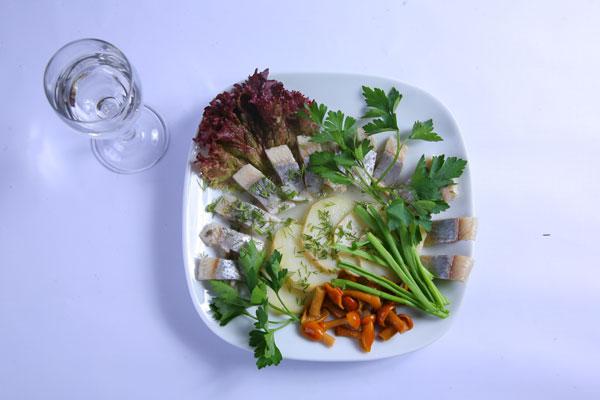
Stirrup.
This is a very old custom, it is also associated with the beginning of a difficult business - traveling, hunting, warlike campaign. So it seems: it is easy jumps up our ancestor warrior in the saddle, adjusts the helmet, armor, sword. Stirrup it supports the stirrup. And in the last minute of farewell he is brought stirrup cup (bowl, cup). Brings goblet on the tray beloved wife. And after the cup (the cup) drunk, her warrior gives stremennomu.
Zakurgannaya Drain zakurgannuyu goblet - custom Cossack steppe.
In the old Cossack villages were set so close to them - on major roads - it must have been the ancient mounds. They placed outposts, towers, signal fires are lit in case of danger.
For the steppe barrows began restless, sometimes wild and uninhabited, full of dangers. And it was decided to accompany the distinguished guests and relatives just for "barrows". And the rest was fate with them will cost ...
This duty - to accompany "for mounds" - belonged to the young, strong, and departed. And it turns out that something like an honorary Cossack escort when young Cossacks competed in bravery, showed skill, horses and weapons. The escort was numerous, the greater the honor and respect to leave.
Finally, we stayed where in such cases did stop even their great-grandparents. Sometimes "zakurgannaya bowl" (damask, cup) embarks on a circle, sometimes filled in hiking circles - each and be sure everything and leave, and mourners. Drink not captive - it was a private matter.
They drank the "zakurgannuyu", as a rule, no snacks, because only just got up from the table, and all his thoughts were already on the road. Drinking under the wishes of good luck, be sure to briefly silence to accidentally not to frighten her, and then looked for a long time as being carried away by the endless steppe road riders ...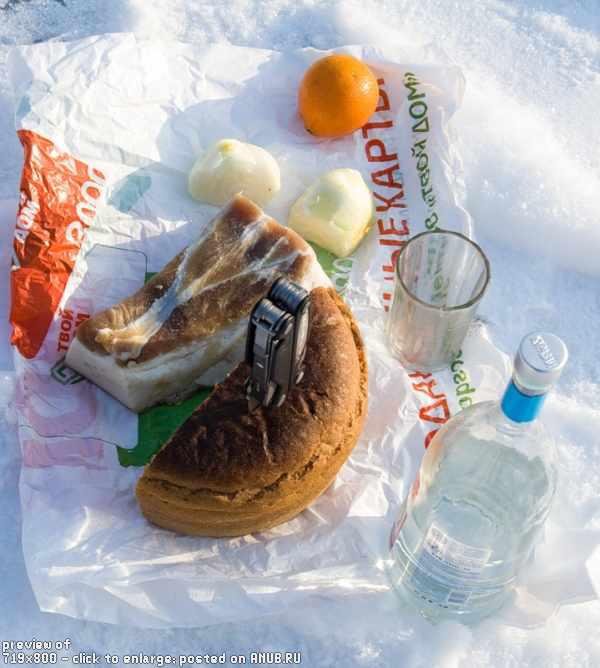
And one for the road, and the stirrup, and zakurgannaya - these cups, as usual, drinking always the same and are not repeated, as were brought from the heart, not from the drunken needs.

"100 front-line." Their during the Great Patriotic soldiers singled himself Voroshilov. Back in 1940, when the Soviet troops in the 40-degree cold stuck in the snow for Finland, Voroshilov ordered to give 100 grams to raise morale, and also as a warming agent. The official order to issue a "narkomovskih" was released August 22, 1941 the State Committee of Defense SSSR.

A toast to health. Under Ivan the Terrible vodka was called various medicinal tinctures and potions. We took a very strong alcohol for medicinal purposes. Now I understand why "the health».
On three. In Soviet times, the husband for lunch was made to issue ruble. And the vodka was worth two hundred eighty seven. Do you want to drink - Seek a third (hence the famous "you'll be third?"). And even on the delivery of cheese "Friendship" has ostanetsya.

Faceted glass. In the XVII century, these glasses were made of hammered together among themselves dosochek, hence the verge ... First glass faceted glass was made in 1943 to designs by Vera Mukhina. According to another version of the famous glass design belongs to Kazimir Malevich. This glass is characterized by increased resistance - if dropped from a meter height onto a hard surface faceted glass remained tselym.

In box 20 bottles of vodka. In pre-Petrine era it was considered the primary measure of vodka bucket. During the reign of Peter I of Russia there is a bottle, it borrows from France. Since the standard bottle had a volume of 0, 6 l., In a bucket fits within exactly 20 bottles. On the basis of these measures was conducted trade documentation ...
Empty bottle can not be put on the table. This provides the following legend: this custom brought the Cossacks, who returned from France after a military campaign of 1812-14 years. In those days, the Parisian waiters do not take into account the number of dispensed bottles. It is much easier to bill - count the empty bottles left over after the meal on the table. One of the Cossacks, and realized that you can save money by removing part of the empty bottles under the table.

One for the road to the track.
It has long been in Russia strangers and travelers enjoyed special respect. Rogue did not like, and strangers privechali. For the pilgrims went through the world not from idleness, and the need mental - on a pilgrimage (pilgrims) walked to the holy places, and for related trade. There were special prayers before the journey and after successful completion, there were practices which firmly adhered to.
Wanderers went from village to village, from one place to the next covenant, leaning on his staff. Staff was also a mainstay in the long jump, and the protection of animals, by dashing counter. In short, it was one companion for many occasions.
Wanderers and traveling to the long road, who knows what it promising a, threw the knapsack on his back, picked up a stick and stopped for a moment at the gate of his native home, or shelter them. Then the tray cup for the road. Typically, she is pouring her eldest in the family. The first - the one who waited a long road. Hex thus were different, but always with the wishes of good luck, "the road to the white tablecloth Stela", "Down and Out to party spared the trouble," "to the path of evil spirits knocked" ... and others with the same meaning.
Sometimes the glass of a ladle or literally put on the staff, at its upper thickened section. And closely monitor if the glass is not tipping - it was a good sign. Embark on a road had to drink a glass of the bottom, leaving a few drops of which should throw over his shoulder - "wet the track." After that cup again on the staff, but have bottomed up-mole, it's done.

Stirrup.
This is a very old custom, it is also associated with the beginning of a difficult business - traveling, hunting, warlike campaign. So it seems: it is easy jumps up our ancestor warrior in the saddle, adjusts the helmet, armor, sword. Stirrup it supports the stirrup. And in the last minute of farewell he is brought stirrup cup (bowl, cup). Brings goblet on the tray beloved wife. And after the cup (the cup) drunk, her warrior gives stremennomu.

Zakurgannaya Drain zakurgannuyu goblet - custom Cossack steppe.
In the old Cossack villages were set so close to them - on major roads - it must have been the ancient mounds. They placed outposts, towers, signal fires are lit in case of danger.
For the steppe barrows began restless, sometimes wild and uninhabited, full of dangers. And it was decided to accompany the distinguished guests and relatives just for "barrows". And the rest was fate with them will cost ...
This duty - to accompany "for mounds" - belonged to the young, strong, and departed. And it turns out that something like an honorary Cossack escort when young Cossacks competed in bravery, showed skill, horses and weapons. The escort was numerous, the greater the honor and respect to leave.
Finally, we stayed where in such cases did stop even their great-grandparents. Sometimes "zakurgannaya bowl" (damask, cup) embarks on a circle, sometimes filled in hiking circles - each and be sure everything and leave, and mourners. Drink not captive - it was a private matter.
They drank the "zakurgannuyu", as a rule, no snacks, because only just got up from the table, and all his thoughts were already on the road. Drinking under the wishes of good luck, be sure to briefly silence to accidentally not to frighten her, and then looked for a long time as being carried away by the endless steppe road riders ...

And one for the road, and the stirrup, and zakurgannaya - these cups, as usual, drinking always the same and are not repeated, as were brought from the heart, not from the drunken needs.







